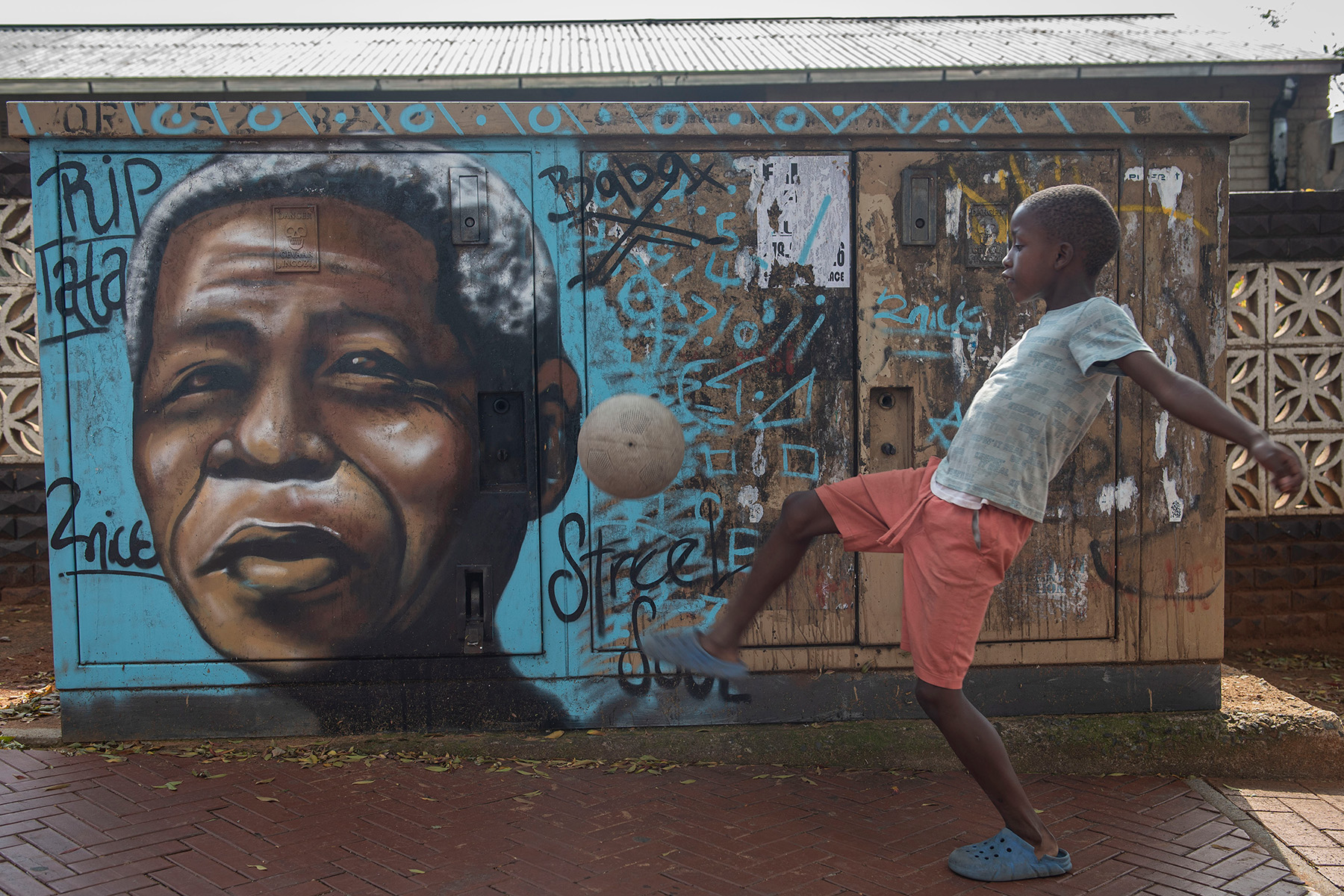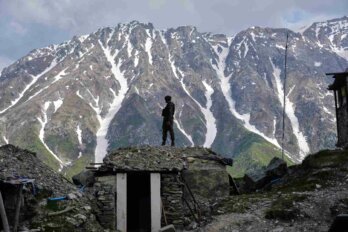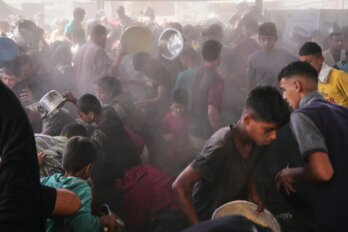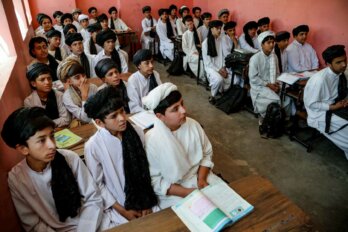This past January, I attended the funeral of Peter Magubane, the legendary South African photojournalist. He had lived to the age of ninety-one, beating out an apartheid state determined to kill him because of his work. He was part of my mother’s extended family. Growing up, I called him Mkhulu, meaning grandfather.
His was an official provincial funeral, attended by high-ranking dignitaries including President Cyril Ramaphosa, who read the eulogy. Before the service, I’d had an idea of the dangerous conditions Mkhulu Peter operated under, but I was still shocked to learn the true extent of the violence the state had meted out against him. Police beat him many times, broke his nose, and at one point, while he was detained, his house was destroyed in a fire. Starting in 1969, he was locked up for 586 days of solitary confinement. After his release, he was banned from taking photographs for five years, an order with which he refused to comply.
During the funeral, these experiences were rightly listed as proof of his exceptional character, heroism, and commitment to fighting apartheid. Sitting in the congregation, I kept thinking that no matter how brave and honourable Mkhulu Peter was, he had to have come back to his family a very different person after his solitary confinement. How much healing and help was he able to access to process his traumatic experiences? But, that day, Ramaphosa, who is also president of the African National Congress—the liberation movement that became Nelson Mandela’s political party, which has been in power for the past three decades—kept to the talking points I had heard at so many funerals and celebrations during that time. To me, the ANC’s repeated hearkening back to the past, when they were the clear heroes, shows how unable they are to handle what the party has become.
Now, in an election year that marks democratic South Africa’s thirtieth anniversary, I think it’s fair to say that most South Africans are disappointed by the trajectory of our democracy. Many young voters born after apartheid, known as “born frees,” see the ANC as a failed governing party—one whose history as a victorious liberation movement has been cemented in public discourse and school curricula, but one that is increasingly irrelevant to them.
During the last national election, in 2019, less than half of South Africans voted, granting the ANC a 57.5 percent majority. This year, a poll in February showed the ANC sitting at less than 40 percent of prospective votes.
This could be a sign of a maturing democracy and diversifying political system, but against the backdrop of other information that has come to light, it seems to show how public confidence in the ruling party has declined. Scandal after scandal has awakened South Africans to the true extent of ANC-led state capture, which has gutted our national institutions and coffers. The findings of the Zondo Commission, a nearly four-year public inquiry into state corruption, implicated a number of high-ranking ANC parliamentarians, including former president Jacob Zuma. The ANC’s own integrity commission recommended that ninety-seven members be left off the party’s ballot list this year because of their implication in the Zondo Commission’s findings.
In recent years, international publications, whose headlines once trumpeted South Africa’s success story, have been publishing their own analyses and probes into the question “What went wrong?” How did Mandela’s dream descend into a nightmare of abject poverty, violent crime, persistent inequality, and struggling education systems, health care, and public services? The most compelling question to me is how the ANC, once the respected home of South Africa’s greatest political minds, became a farce.
The ANC—and the decades-long anti-apartheid mass movement of which it was a part—has been intertwined with almost every aspect of my family’s history for close to a century. I was almost six years old when the country held its first democratic elections. When I think back on the past thirty years, I realize that you don’t remember history by what was or was not happening. You remember how it felt. And those feelings can serve as records, just as valid as any official account in any history book, if we can only be brave enough to hold them up to the light and really look at them.
Mkhulu Peter’s funeral took place the day before South Africa’s legal team appeared at the International Court of Justice, in The Hague, to present a case arguing that Israel’s military actions against Palestinians in Gaza are genocidal. I was moved to tears watching an Al Jazeera broadcast of Palestinians gathered around a statue of Nelson Mandela in Ramallah while the South African national anthem played. Our flag was hoisted outside the Bethlehem municipality. On social media, South Africans expressed their pride at the work of our minister of international relations and co-operation, Naledi Pandor, who led the delegation at The Hague.
I found myself recalling the early days of our new political dispensation in 1994. Despite all signs at the time pointing to imminent civil war, Mandela led a broken, divided nation through peaceful democratic elections. The Rainbow Nation, as we came to be called, defied the world’s fears and expectations.
My mother, Gugu, had grown up in exile, helping her parents staple and pass out ANC fliers when her family lived in Zambia and suburban Connecticut. My father, Diliza Jr., was jailed for his student activism, at twenty-one, and spent some time in solitary confinement. His father, Diliza Sr., was one of Mandela’s close friends and a fellow member of the early ANC Youth League. Diliza Sr. was riding shotgun the day Mandela first spotted his future wife, Winnie Madikizela, at a bus stop and immediately fell for her beauty.
My sisters and I grew up having to entertain ourselves during weekends at Aunt or Uncle So-and-So’s houses, where my parents attended hours-long ANC meetings. In 1991, the Group Areas Act, which had legalized racially segregated neighbourhoods, was abolished; soon afterward, we moved to our first house in the suburbs, where we were the only Black family on our street. On the eve of the 1994 election, I remember my father coming home with a giant framed ANC poster, which he hung right in the middle of our entrance hall. It was a picture of Mandela sitting with a group of smiling children, with the slogan “A Better Life for All.” At the time, I was too young to appreciate what it might have meant to my father to be able to give the ANC colours and Mandela’s image pride of place in his home. For so many years, it had been dangerous to even mention the man’s name.
My memories of the initial project of rebuilding the nation are those of a celebratory public process. We cleared away many memorials and symbols of apartheid and replaced them with monuments to the new national heroes credited with destroying the system. As schoolchildren, we learned about the country’s political history and about men like Mandela, Magubane, and their contemporaries who shared a vision of a free South Africa and a willingness to sacrifice for it. Public holidays like Youth Day and Human Rights Day were declared. The Truth and Reconciliation Commission was established to deal with the task of exposing the former machinery’s many crimes, including torture, kidnapping, and murder. The TRC hearings, which ran for four years, explored ways to compensate victims and hold perpetrators accountable through restorative, non-penal measures.
In my view, the TRC largely failed in its mandate. Apartheid lasted for forty-six years. It was, by design, as much a system of personal, emotional, mental, and relational disruption as it was a legal and economic one. The massive scope of its crimes could not reasonably have been dealt with within the time frame of the commission. There was no public process to address the daily degradation and loss of dignity from injustices such as land dispossession, the migrant labour economy, pass laws, the racially segregated Bantu education system, and the Dop system, which legalized paying labourers with wine. So that healing work was relegated to the private sphere. Individuals and families grappled with psychological and emotional scars so deep that they are often mistaken for personal, familial, or racial traits.
When I ask myself, “What went wrong?,” that is my answer. Apartheid didn’t end with those who fought it decades ago; it lives on through intergenerational trauma. The numbers alone are shocking enough: epidemic levels of sexual and domestic violence against women and children and a homicide rate of forty-two murders per 100,000 people in 2021—about four times higher than the average rate for regions the World Bank categorizes as “fragile and conflict affected.”
Those statistics both point to and obscure the many ways South Africans need to heal our generational legacy. We often talk about how we need better legal systems to address violent crimes today; we don’t talk as much about how we become a society where such crimes are no longer rampant—a society that is able to confront and heal the scars of so many generations of dysfunction.
For me, making sense of our history stemmed from a healing process I began in my early thirties. I started going to therapy and reading books about childhood and trauma. I wanted to understand why my parents, who had achieved their dreams of freedom and prosperity for themselves and their family against all odds, sometimes seemed—in my view—mentally and emotionally stuck in a bad place. We engaged in all the public activities of a happy family: dinners, vacations, spirited intellectual debates. Not from a place of pretence, I believe, but from one of true effort. Our emotional life was distant and tense; to me, my parents seemed much more comfortable expressing negative emotions than positive ones.
My father could be intellectually engaging and physically affectionate but also emotionally unavailable and volatile. I remember him as demanding and controlling, imposing rules that struck me as arbitrary. Fun outings, bedtime routines, unexpected treats, and tickles were rare. It was my mother’s ways of enabling my father that set me down the path of self-healing. She’d often excuse his behaviour with the usual “He loves you but” and refer to some of the difficult things he’d gone through in prison and at the hands of the apartheid government as explanations for why he was so emotionally damaged. My childhood mistakes (not finishing all of my dinner, talking back) sparked cruel, outsized reactions in him, as though my acting out were part of a plot to destroy him. Looking back, his distrust of me seemed almost like a form of paranoia.
If my mother was the “safer” parent, it was because she was there for me day to day and was far more approachable. But, though my mom did not go through the obvious, quantifiable traumas like arrest or solitary confinement, that does not mean the system left her life unharmed. Childhood instability and family separation are shared experiences across my extended family. The reasons for them were always tied to striving toward the best outcomes under a system that forced people to make hard decisions.
My mother endured a long period of separation from her father when he went to the US on a student scholarship. The South African government prevented him from returning, so the rest of the family eventually joined him. My mother has told me of the shock of being transplanted into a completely new country. She and her sisters arrived in the United States not knowing how to speak English and never having been so close with white people. As the eldest of four girls, she took on a lot of responsibility to help her parents and siblings with the transition.
Throughout their lives, my parents survived terrifying near misses and goodbyes that could have easily ended up being permanent. When they got together, in the 1980s, it was during the dying years of apartheid, when the state and the resistance movements had both ramped up their battles. While navigating the normal newlywed challenges of starting a family, they were also dealing with police harassment, my father’s banning orders—which restricted his movements and ability to gather with people—and an increasingly tense political climate. In 1988, the year I was born, South Africa was under a state of emergency that lasted four years. One day, while my pregnant mother was home, with my sisters playing outside, a tear gas canister landed in the front yard of their home. After that, it was decided that my mother and sisters would travel to the US so that my mother could be with her parents and give birth to me in a safer environment. My father stayed behind in South Africa. We returned a few months later.
To me, this story explains the heightened sense of anxiety my mother raised me with. She is fun, worldly, and stylish, and she always encouraged me to embrace life and see the world just like she did in her youth. But she also had a tendency to catastrophize and panic at the slightest pressure, which often left me choosing to just deal with things on my own growing up.
Similarly, I came to realize that telling stories about the past was pretty much the most my parents could or would do to participate in my process of confronting it. In order not to engage with my future children the way that my parents had with me, I wanted to face my historical pain. I started to apply that self-examination to understand how our country has continued to be such a terrifying place.
Just like in the election poster, Nelson Mandela’s love of children was well documented throughout his presidency. The majority of his philanthropic work was focused on children, and his delight in their presence shone through in person and in photographs. But, in his autobiography, Long Walk to Freedom, the statesman wrote of his regrets about his extended absences from his own children’s lives because of his activism, incarceration, and eventual presidency. His daughter Makaziwe has also spoken of the distress the siblings suffered because of their father’s absence.
Leading up to the thirtieth anniversary of Mandela’s election as the public father of the nation, some of the most shocking news stories about his legacy have been about his private life. In recent years, members of his family have publicly battled over the right to auction some personal items, including his hearing aids and ID document. His former homes are falling into disrepair due to neglect. Not even the greatest among us is exempt from needing community support and space to struggle openly. I hope that understanding sets the agenda for the next few decades of continuing to shape this dynamic, hard-won young democracy of ours.
It may not be possible for our current crop of leaders to engage with concepts like healing, pain, and trauma—which are coded as ephemeral, unsubstantiated, and unrelated to the work of governance. But, when millions of people are expected to seek private, individualized solutions to such a widespread problem, how can the issue not touch on governance?
Cyril Ramaphosa and some of the other officials who attended Mkhulu Peter’s funeral are the same political minds who began their careers thirty years ago, full of promise and with the confidence of the nation. As I watched them give their speeches and pay their respects in January, they seemed at once weak and immovable—gripping tightly to power out of sheer desperation and myopic egos.
There is an isiZulu song whose lyrics go, “Sasingenjena, soniwa ngabantu. Sasingenjena, basiphendula inhliziyo.” We were not like this, we were soured by people. We were not like this, they turned our hearts.
In my increasingly rare moments of compassionate consideration for Ramaphosa and his comrades, I think about how South Africa let down those young heroes just as much as—or even because—we tirelessly celebrated their accomplishments. Perhaps they also let themselves down by masculinizing transformation and reconciliation processes to the point that there weren’t enough alternative voices and perspectives to bring the often feminized, privatized work of healing to the national agenda.
Beyond voting in the upcoming election, there is much ownership to be taken and work to be done on our parts—the work of deciding and pursuing who we want to be as a people, what we want it to feel like to be South African. These issues don’t fit neatly into a campaign-trail talking point like crime or public services.
When I started my own process of healing, I was keen to share it with my parents and my sisters. I wanted it to draw us closer together. I’ve learned, however, that the five of us understand and remember in our own ways. Some prefer to focus on the heroism and happy endings. The bravery and greatness we are descended from that got us to where we are now, against difficult odds. Digging into the ways things didn’t turn out okay just feels too threatening. Pointless, even.
But I see this difficult, often ugly process of tending to the lasting wounds as my way of honouring all who came before me. Of completing the work.





